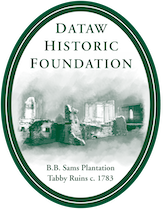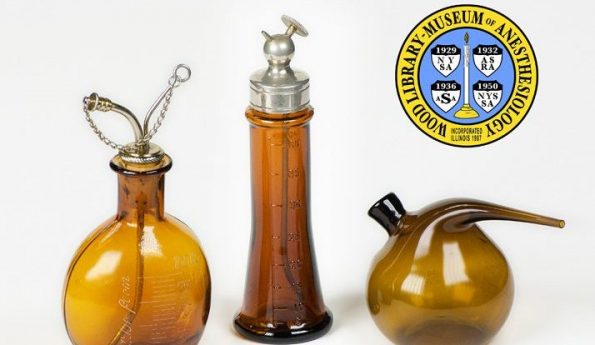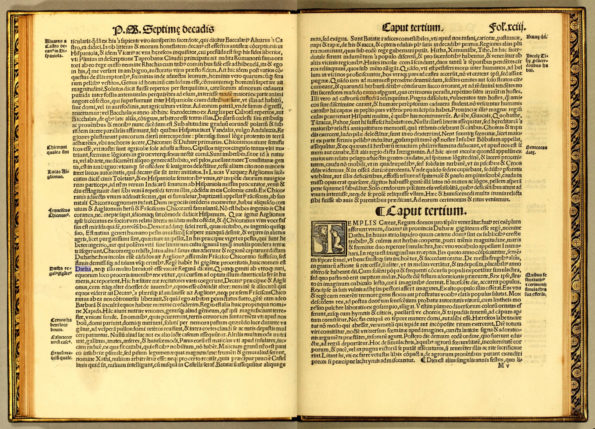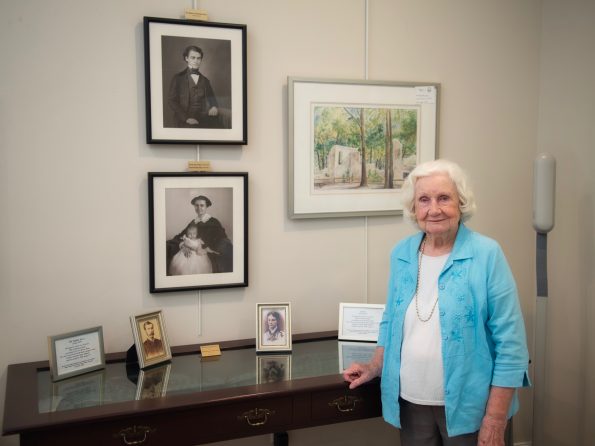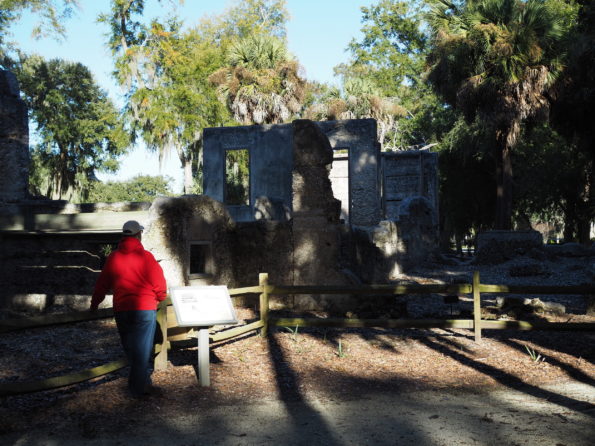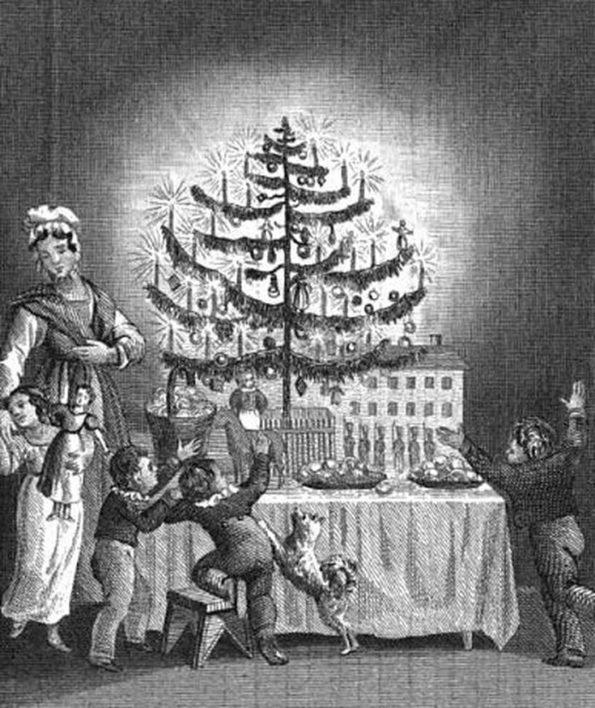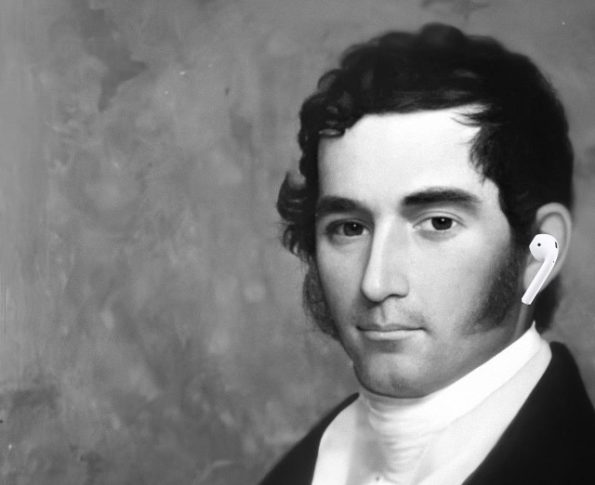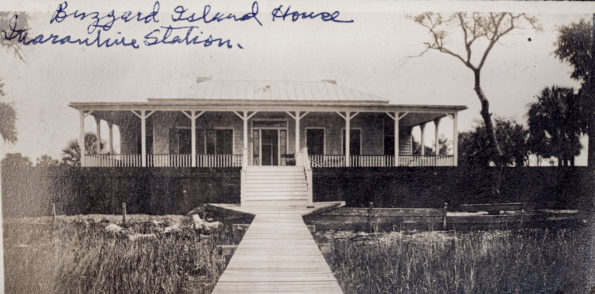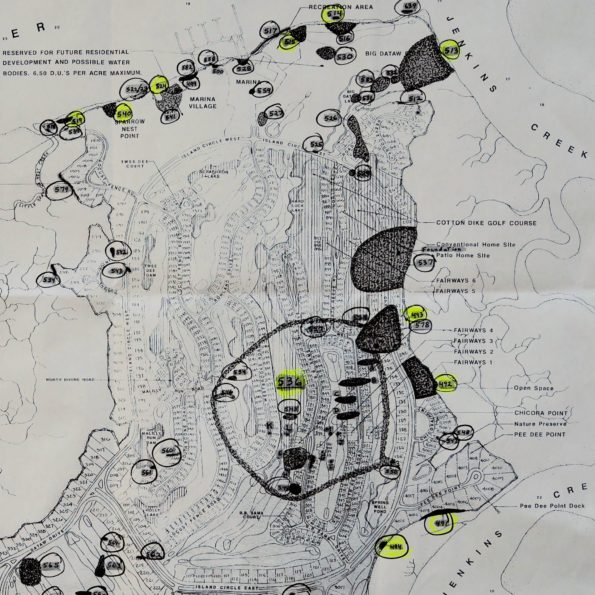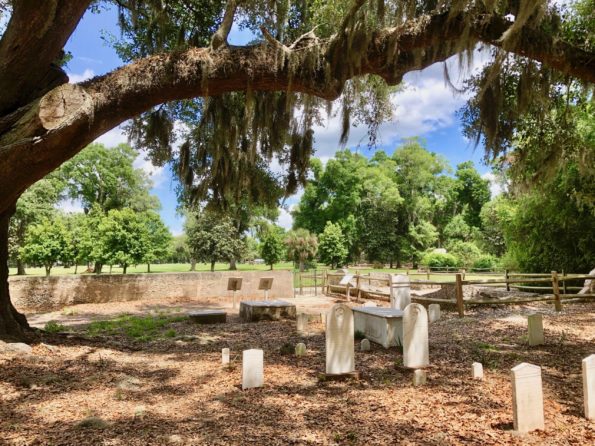William Sams, grandson of Colonel John “Tuscarora Jack” Barnwell, was born in South Carolina on April 18, 1741. With the fall of Charleston and Beaufort during the American Revolution, William was forced to leave his home on Wadmalaw Island and purchased Dataw Island in 1783. At Dataw, he began to grow Sea Island cotton. It was cotton that made the Sams family wealthy and the Beaufort region “the exclusive home of the most exclusive few of that most exclusive aristocracy.”
Articles from this era address the period 1783 to 1865.
In my recent post on Sarah J Sams, you saw restored photographs of her and her husband, Dr. R Randolph Sams. Large reprints are hanging in the Dataw Island History & Learning Center through the generosity of Teresa (Winters) Bridges. Sarah’s original image (i.e., ambrotype) holding their daughter Phoebe was taken in about 1858 when Sarah was in her early 20s. Randolph’s image (i.e., daguerreotype) shows a handsome young man upon graduation from college in 1849, also in his early 20s. What’s most interesting about Dr. R. Randolph Sams is his role in the earliest days of modern dentistry.
In response to an article about Northern Datha Island, a resident who has lived here thirty years (!) commented, “I have always questioned why ALCOA did not call the Island by its real name: Datha?”
Researching this question took me on a fascinating journey from a Muskogean Indian Chief to the King of Spain to the U.S. Board on Geographic Names. In the end, I can provide this answer; Dataw Island is the name of our development on a sea island in South Carolina called Datha Island.
What’s left for this journey is to explain why our sea island is called Datha Island and why our development is called Dataw Island.
You are looking at the faces of a family deeply affected by the Civil War and looking for a brighter future. This photo is dated 16th October 1866. On the back are the words, ‘Picture taken just as family was leaving S.C. for Galveston, Texas.’ Dr. Lewis Reeve Sams, Jr. (1810 – 1888) took his family ”so far away” from Beaufort, SC.
The people in this single image above span 184 years of Sams descendants; from today back to the working plantation days when B.B. Sams was growing Sea Island cotton here on Dataw Island.
Dr. Berners Barnwell Sams, M.D. (1787 – 1855) – BB Sams is named after his Great Grandmother Elizabeth Anne (Berners) Barnwell and his Grandmother Bridgett (Barnwell) Sams, according to Sams’ family descendants. Berners Barnwell Sams was the son of William Sams (1741-1798) and Elizabeth (Hext) Sams (1746-1813). He inherited one-third of his father’s Dataw Island plantation in 1808 when he came of age. We know a fair amount about Dr. BB Sams. However, today we have a much more colorful understanding of the man. In 2019 we were given a copy of an unpublished family history penned in the early 1900s by Conway Whittle Sams (grandson of BB Sams). This unpublished work contains a first-person description of Dr. BB Sams provided by his daughter, Elizabeth Exima Sams in 1905.
Presentation by Bill Riski, of the Dataw Historic Society, on the history of sea island cotton. He explains why plantations came to the sea islands, why this crop was unique to the sea islands, why it was so desirable, and why it disappeared. This presentation adds to the body of knowledge of the Sams of South Carolina. Though sea island cotton generated enormous wealth for a few, it required great suffering by many.
It was 237 years ago that William Sams and his wife Elizabeth Hext bought Datha Island and started the journey that led to Alcoa South Carolina Inc. and the residential community we know as Dataw Island. I’ve really enjoyed writing the 52 Sams in 52 Weeks series this year. It has been a labor of exploration and discovery from the Dataw Historic Foundation for the island residents and Sams descendants. Now it’s time for a break. Rather than continue the weekly rhythm, I plan to cut back to ‘whenever.’ History comes from memories, from experience, from events both personal and public. I will be following the truth of these, and I will write again as the stories inspire me. [1]
From my experience this year and your feedback, it is clear that “history matters to people on this island.”
Christmas in the Lowcountry of South Carolina will be celebrated this week, as it has been for centuries. However, back in the antebellum days, the planters celebrated one way, and the enslaved in a much different way. Like the plantation system, which was imported from Britain, the Christmas traditions when the Reverend James Julius Sams (1826 – 1918) reflected on his childhood around 1835 – 1840 on Datha Island were probably more British-inspired than German. Julius begins his reflections about Christmas this way,
“Christmas was the merriest and saddest time. The merriest, because we were all together. The saddest, because the time was coming for us to part again.”
52 Sams in 52 Weeks is now on its final approach. We are about to put the landing gear down (week 50), land (week 51), and taxi to the terminal (week 52). These last three posts have a lot of variety. Week 50 – Listen to History. Today you’ll hear a story of recent history. Week 51 – An Antebellum Christmas. On December 22nd, I’ll tell you what we know about Christmas on Datha in the mid 1800s and about antebellum Christmases in general. Week 52 – Reflections and Resolutions. On December 29th, I’ll reflect on 2020 and talk about what comes next in 2021.
Listen to History: The first recording below is of a Dataw Island resident that spent two years building the Sams Plantation House model, prominently displayed in your History & Learning Center. The second recording is an excerpt from an original letter written by Sarah Sams to her husband, Dr. Robert Randolph Sams, while he was away in the Civil War. Her distant cousin reads the excerpt.
Throughout 2020 I’ve taken or accumulated images that have not made it into this 52 Sams in 52 Weeks series – but they deserve some attention. Here are pictures which span about 150 years, each with their own short story. Most have never been published. Many came from the storage bin in Miss Ting’s home in Beaufort. This week I present a collection of pictures from our DHF shoebox, with short stories.

This week I focus on the history of the north half of our island. Datha Island has been inhabited continually from the Late Archaic period (3,000 – 1,000 B.C.) up to the present. I’ll address the prehistoric periods, the Lewis Reeve Sams ownership years, and farming after the Civil War. I am indebted to archaeologist Larry Lepionka and his team for their work back in 1987-1988 to investigate and document the historic sites on Dataw Island. The island would be covered in a forest if left to nature. This is one factor that distinguishes the northern from the southern half of Datha Island. The north half was plowed and cultivated continuously from the mid-1700s to 1960; the southern half was not. The northern half is also where the preponderance of evidence was found for Native American habitation as far back as 3000 B.C. Therefore, where the Native Americans once lived was also the area most disturbed by farming in the 19th and 20th centuries. Kudos go to Lepionka and other archeologists for rediscovering their presence thousands of years before. I’ll explore middens, and then I’ll show you Domino.
The theme this week is ‘gone too soon.’ Through Week 43-Spooky, I’ve told you about 188 ancestors or descendants of William Sams and Elizabeth Hext. Nearly all are in their direct lineage, though there are a few distant cousins in the mix. I’ve told you about all seven sons of William & Elizabeth, but not all their families. Three sons never married (Robert, William, Jr., and Francis), and I have not told you much about the families of John and Edward Hext. Maybe I will someday, but I just have not had time to do the research necessary to ‘bring them to life.’ However, several children of our Sams brothers, Lewis Reeve and Berners Barnwell, I’ve not mentioned either. This week I’ll speak of the children that left us too early.
